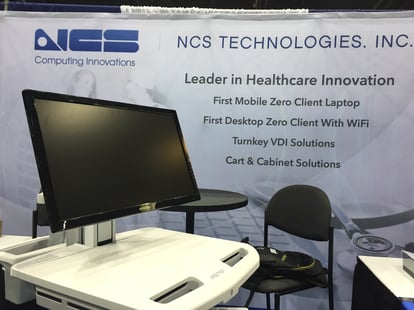While NCS Technologies is known for providing a wide variety of computing solutions to government, the military and the intelligence community, healthcare providers are among the most persistent visitors to our website.
My guess is that by using search engines and monitoring social media, IT oriented folks in the healthcare space find us because they are looking to implement virtual technology and VDI. They are trying to find out how to make healthcare computing more reliable, less complex, more secure and cost effective - goals definitely shared in government, the military and the intelligence community. 
As a frequent visitor to hospitals, clinics, doctor's offices and labs, it's evident that healthcare workers rely on computers and networking in nearly every aspect of their jobs. Patient records and scheduling need to be kept up to date and secure. Imagery such as MRIs and X-rays need to be available and accessed from distant servers. Doctors and nurses are constantly on the move and frequently use carts to bring mobile computing - and the latest patient information - directly into each patient area.
Like all other industries, budgets are stretched and not all technology in use is constantly up to date. Just this week I saw Windows XP, no longer supported by Microsoft, in use in an innovative neurology practice. Of course, hackers could have a field day with this ancient software which is no longer protected by security updates.
But professionals realize they need to move forward in the most secure and efficient way possible and that's why many in healthcare are ramping up their virtualization strategy. Virtualization addresses the need to access data from a variety of devices and locations. Virtual zero client endpoints - laptops or desktops - enable the "anyone, anywhere" scenario because there is no persistent user data on the device. Anyone can grab any zero client and log in to their virtual environment from any location - often along hospital corridors. Because virtual solutions are so helpful in all these scenarios, VDI in healthcare is ramping up quickly.
Zero clients - such as the NCS Cirrus LT laptop or the Cirrus DT WiFi mobile desktop - offer a consistent user experience no matter which device they use. Because the virtual laptop or desktop is hosted on a powerful server in a datacenter, the user experience is always the same - up to date and secure.
There is no doubt that healthcare space is beginning to make the move to VDI in a significant way If you would like to learn more about virtualization in healthcare, please download our whitepaper here.


